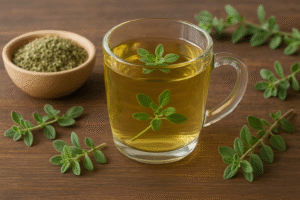Rheumatoid Arthritis (RA): Causes, Symptoms, and Natural Relief Tips
Rheumatoid arthritis (RA) is a chronic autoimmune condition that primarily affects the joints, causing inflammation, swelling, and pain. Beyond the joints, RA can involve the skin, lungs, heart, and other organs. Understanding the causes, symptoms, and available treatments for RA is crucial for effective management and improving quality of life.
Causes and Risk Factors of Rheumatoid Arthritis
The precise cause of RA remains unknown, but a combination of genetic, environmental, and lifestyle factors contributes to its development.
- Genetics: Specific genetic markers like HLA-DR4 increase susceptibility.
- Gender: Women are more prone to RA than men.
- Age: Commonly develops between the ages of 40 and 60.
- Family History: A higher risk exists if relatives have RA.
- Lifestyle Factors:
- Smoking: Elevates risk and worsens RA symptoms.
- Obesity: Adds stress to joints and heightens inflammation.
Signs and Symptoms of Rheumatoid Arthritis
RA often presents symmetrically, affecting the same joints on both sides of the body.
- Common Symptoms:
- Tender, warm, and swollen joints.
- Morning stiffness lasting more than an hour.
- Fatigue, fever, and loss of appetite.
- Advanced Symptoms:
- Rheumatoid nodules (firm lumps under the skin).
- Anemia or low red blood cell count.
- Weight loss.
Complications of Rheumatoid Arthritis
Without timely intervention, RA can lead to severe health complications, including:
- Joint Damage: Permanent deformity and loss of function.
- Heart Disease: Higher risk of stroke and cardiovascular issues.
- Lung Problems: Scarring and inflammation in lung tissues.
- Osteoporosis: Increased bone fragility due to inflammation and medication side effects.
Natural Relief Tips for Managing RA
While there’s no cure for RA, natural strategies can complement medical treatments to ease symptoms and support joint health.
Anti-Inflammatory Diet
A diet rich in anti-inflammatory foods can reduce joint inflammation and pain.
- Foods to Include:
- Leafy greens, berries, and cruciferous vegetables.
- Omega-3-rich fish like salmon and mackerel.
- Spices such as turmeric and ginger.
- Foods to Avoid:
- Processed sugars, trans fats, and refined carbs.
Exercise for Joint Health
Engaging in regular, low-impact activities strengthens muscles and improves joint mobility.
- Recommended Activities:
- Swimming and water aerobics.
- Yoga and tai chi.
- Brisk walking or cycling.
Supplements for RA Symptom Management
Adding specific supplements to your routine can help reduce inflammation and promote joint health.
- Omega-3 Fatty Acids: Reduces swelling and joint stiffness.
- Vitamin D: Essential for bone health and immune regulation.
- Glucosamine and Chondroitin: Supports cartilage repair.
- Boswellia: Known for its anti-inflammatory properties.
- Probiotics: Promotes gut health, which is linked to overall immune function.
Holistic Lifestyle Tips for RA
Adopting these strategies can further alleviate symptoms and improve overall well-being:
- Quit Smoking: Significantly reduces disease progression and improves outcomes.
- Stress Management: Practice meditation, mindfulness, or yoga to lower stress levels.
- Stay Hydrated: Reduces inflammation and maintains joint lubrication.
- Maintain a Healthy Weight: Eases pressure on joints and minimizes flare-ups.
Prevention and Early Detection
While RA cannot be entirely prevented, early detection and proactive management can significantly reduce its impact:
- Regular health checkups and screenings.
- Monitoring early signs like prolonged morning stiffness.
- Consulting a healthcare provider at the first indication of symptoms.
Conclusion
Rheumatoid arthritis, while chronic and challenging, can be managed effectively with the right combination of medical care, natural remedies, and lifestyle adjustments. By focusing on a balanced diet, regular exercise, and targeted supplements, individuals with RA can minimize symptoms, prevent complications, and lead an active, fulfilling life.
Take charge of your health today by consulting a medical professional and implementing small, consistent changes to support your joint health and overall well-being.
References
- Mayo Clinic: Rheumatoid Arthritis Overview
- Arthritis Foundation: RA Causes and Symptoms
- National Institute of Arthritis and Musculoskeletal and Skin Diseases
- CEDEM COLLAGEN: Joints – Joint Support for Flexibility and Mobility

Suleiman Atieh, experienced pharmacist specializing in healthcare, patient wellness, safe medication practices, disease management, and supplement guidance.








